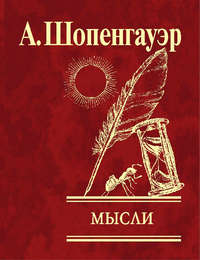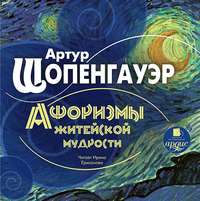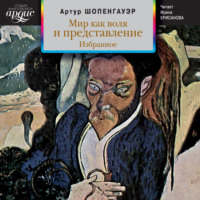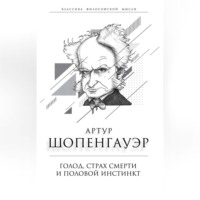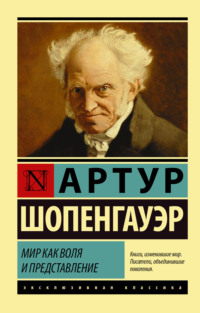 полная версия
полная версияThe World as Will and Idea (Vol. 3 of 3)
Now, as regards the second part of the principle set up thus the inheritance of the intellect from the mother, this enjoys a far more general acceptance than the first part, which in itself appeals to the liberum arbitrium indifferentiæ, while its separate apprehension is opposed by the doctrine of the simplicity and indivisibility of the soul. Even the old and popular expression “mother-wit” shows the early recognition of this second truth, which depends upon the experience both with regard to small and great intellectual endowments, that they are the possession of those whose mothers proportionately distinguished themselves by their intelligence. That, on the other hand, the intellectual qualities of the father are not transmitted to the son is proved both by the fathers and the sons of men distinguished by the most eminent faculties, for, as a rule, they are quite ordinary men, without a trace of the paternal mental gifts. But if now an isolated exception to this experience, so often confirmed, should appear; such, for example, as is presented by Pitt and his father, Lord Chatham, we are warranted in ascribing it to accident, nay, obliged to do so, although, on account of the exceptional rarity of great talents, it is certainly an accident of a most extraordinary kind. Here, however, the rule holds good: it is improbable that the improbable never happens. Besides, great statesmen (as was already mentioned in chapter 22) are so just as much through the qualities of their character, thus through what is inherited from the father, as through the superiority of their mind. On the other hand, among artists, poets, and philosophers, to whose works alone genius is properly ascribed, I know of no case analogous to that. Raphael's father was certainly a painter, but not a great one; Mozart's father, and also his son, were musicians, but not great ones. However, it is indeed wonderful that the fate which had destined a very short life to both of these men, each the greatest in his own sphere, as it were by way of compensation, took care, by letting them be born already in their workshop, that, without suffering the loss of time in youth which for the most part occurs in the case of other men of genius, they received even from childhood, through paternal example and instruction, the necessary introduction into the art to which they were exclusively destined. This secret and mysterious power which seems to guide the individual life I have made the subject of special investigations, which I have communicated in the essay, “Ueber die scheinbare Absichtlichkeit im Schicksale des Einzelnen” (Parerga, vol. i.). It is further to be observed here that there are certain scientific occupations which certainly presuppose good native faculties, yet not those which are really rare and extraordinary; while the principal requirements are zealous efforts, diligence, patience, early instruction, sustained study, and much practice. From this, and not from the inheritance of the intellect of the father, the fact is to be explained that, since the son always willingly follows the path that has been opened up by the father, and almost all businesses are hereditary in certain families, in some sciences also, which before everything demand diligence and persistence, individual families can show a succession of men of merit; such are the Scaligers, the Bernouillis, the Cassinis, the Herschels.
The number of proofs of the actual inheritance of the intellect of the mother would be much greater than it appears if it were not that the character and disposition of the female sex is such that women rarely give public proof of their mental faculties; and therefore these do not become historical, and thus known to posterity. Besides, on account of the weaker nature in general of the female sex, these faculties themselves can never reach the grade in them to which they may afterwards rise in the son; thus, with reference to themselves, we have to estimate their achievements higher in this proportion. Accordingly, in the first instance, only the following examples present themselves as proofs of our truth. Joseph II. was the son of Maria Theresia. Cardanus says in the third chapter, “De vita propria:” “Mater mea fuit memoria et ingenio pollens.” J. J. Rousseau says in the first book of the “Confessions:” “La beauté de ma mère, son esprit, ses talents, – elle en avait de trop brillans pour son état,” &c., and then quotes some delightful lines of hers. D'Alembert was the illegitimate son of Claudine de Tencin, a woman of superior mind, and the author of several romances and similar works, which met with great approbation in her day, and should even still be enjoyable (see her biography in the “Blätter für litterarische Unterhaltung,” March 1845, Nos. 71-73). That Buffon's mother was a remarkable woman is shown by the following passage from the “Voyage à Montbar, par Hérault de Sechelles,” which Flourens quotes in his “Histoire des travaux de Buffon,” p. 288: “Buffon avait ce principe qu'en général les enfants tenaient de leur mère leurs qualités intellectuelles et morales: et lorsqu'il l'avait développé dans la conversation, il en faisait sur-le-champ l'application à lui-même, en faisant un éloge pompeux de sa mère, qui avait en effet, beaucoup d'esprit, des connaissances étandues, et une tête très bien organisée.” That he includes the moral qualities is an error which is either committed by the reporter, or depends upon the fact that his mother had accidentally the same character as himself and his father. The contrary of this is shown in innumerable cases in which the mother and the son have opposite characters. Hence the greatest dramatists could present, in Orestes and Hamlet, mother and son in hostile conflict, in which the son appears as the moral representative and avenger of his father. On the other hand, the converse case, that the son should appear as the moral representative and avenger of the mother against the father, would be revolting and, at the same time, almost absurd. This depends upon the fact that between father and son there is actual identity of nature, which is the will, but between mother and son there is merely identity of intellect, and even this only in a conditioned manner. Between mother and son the greatest moral opposition can exist, between father and son only an intellectual opposition. From this point of view, also, one should recognise the necessity of the Salic law: the woman cannot carry on the race. Hume says in his short autobiography: “Our mother was a woman of singular merit.” It is said of Kant's mother in the most recent biography by F. W. Schubert: “According to the judgment of her son himself, she was a woman of great natural understanding. For that time, when there was so little opportunity for the education of girls, she was exceptionally well instructed, and she also continued later to care for her further education by herself. In the course of walks she drew the attention of her son to all kinds of natural phenomena, and tried to explain to him through them the power of God.” What a remarkably able, clever, and superior woman Goethe's mother was is now universally known. How much she has been spoken of in literature! while his father has not been spoken of at all; Goethe himself describes him as a man of subordinate faculties. Schiller's mother was susceptible to poetry, and made verses herself, a fragment of which will be found in his biography by Schwab. Bürger, that genuine poetic genius, to whom perhaps the first place after Goethe among German poets belongs – for compared with his ballads those of Schiller seem cold and laboured – has given an account of his parents which for us is significant, and which his friend and physician, Althof repeats in his biography which appeared in 1798, in these words: “Bürger's father was certainly provided with a variety of knowledge after the manner of study prevalent at the time, and was also a good, honourable man; but he loved his quiet comfort and his pipe of tobacco so much, that, as my friend used to say, he had always first to pull himself together if he was going to apply himself for a quarter of an hour or so to the instruction of his son. His wife was a woman of extraordinary mental endowments, which, however, were so little cultivated that she had scarcely learnt to write legibly. Bürger thought that with proper culture his mother would have been the most famous of her sex, although he several times expressed a strong disapproval of different traits of her moral character. However, he believed that he inherited from his mother some mental gifts, and from his father an agreement with his moral character.” Walter Scott's mother was a poetess, and was in communication with the wits of her time, as we learn from the obituary notice of Walter Scott in the Globe of 24th September 1832. That poems of hers appeared in print in 1789 I find from an article entitled “Mother-wit,” in the Blätter für litterarische Unterhaltung of 4th October 1841, published by Brockhaus, which gives a long list of clever mothers of distinguished men, from which I shall only take two: “Bacon's mother was a distinguished linguist, wrote and translated several works, and in all of them showed learning, acuteness, and taste. Boerhave's mother distinguished herself through medical knowledge.” On the other hand, Haller has preserved for us a strong proof of the inheritance of the mental weakness of the mother, for he says: “E duabus patriciis sororibus, ob divitias maritos nactis, quum tamen fatuis essent proximæ, novimus in nobilissimas gentes nunc a seculo retro ejus morbi manasse semina, ut etiam in quarta generatione, quintave, omnium posterorum aliqui fatui supersint” (Elementa physiol., Lib. xxix. § 8). Also, according to Esquirol, madness is more frequently inherited from the mother than the father. If, however, it is inherited from the father, I attribute this to the disposition of the character whose influence occasions it.
It seems to follow from our principle that sons of the same mother have equal mental capacity, and if one should be highly gifted the other must be so also. Sometimes it is so. Examples of this are the Carracci, Joseph and Michael Haydn, Bernard and Andreas Romberg, George and Frederic Cuvier. I would also add the brothers Schlegel, if it were not that the younger, Friedrich, made himself unworthy of the honour of being named along with his excellent, blameless, and highly distinguished brother, August Wilhelm, by the disgraceful obscurantism which in the last quarter of his life he pursued along with Adam Müller. For obscurantism is a sin, possibly not against the Holy Spirit, but yet against the human spirit, which one ought therefore never to forgive, but always and everywhere implacably to remember against whoever has been guilty of it, and take every opportunity of showing contempt for him so long as he lives, nay, after he is dead. But just as often the above result does not take place; for example, Kant's brother was quite an ordinary man. To explain this I must remind the reader of what is said in the thirty-first chapter on the physiological conditions of genius. Not only an extraordinarily developed and absolutely correctly formed brain (the share of the mother) is required, but also a very energetic action of the heart to animate it, i. e., subjectively a passionate will, a lively temperament: this is the inheritance from the father. But this quality is at its height only during the father's strongest years; and the mother ages still more quickly. Accordingly the highly gifted sons will, as a rule, be the eldest, begotten in the full strength of both parents; thus Kant's brother was eleven years younger than him. Even in the case of two distinguished brothers, as a rule, the elder will be the superior. But not only the age, but every temporary ebb of the vital force or other disturbance of health in the parents at the time when the child is begotten may interfere with the part of one or other, and prevent the appearance of a man of eminent talent, which is therefore so exceedingly rare a phenomenon. It may be said, in passing, that in the case of twins the absence of all the differences just mentioned is the cause of the quasi-identity of their nature.
If single cases should be found in which a highly gifted son had a mother who was not mentally distinguished at all, this may be explained from the fact that this mother herself had a phlegmatic father, and on this account her more than ordinarily developed brain was not adequately excited by a corresponding energy of the circulation – a necessary condition, as I have explained above in chapter 31. Nevertheless, her highly perfected nervous and cerebral system was transmitted to the son, in whose case a father with a lively and passionate disposition and an energetic action of the heart was added, and thus the other physical condition of great mental power first appeared here. Perhaps this was Byron's case, since we nowhere find the mental advantages of his mother mentioned. The same explanation is also to be applied to the case in which the mother of a son of genius who was herself distinguished for mental gifts had a mother who was by no means clever, for the father of the latter has been a man of a phlegmatic disposition.
The inharmonious, disproportionate, ambiguous element in the character of most men might perhaps be referred to the fact that the individual has not a simple origin, but derives the will from the father and the intellect from the mother. The more heterogeneous and ill-adapted to each other the two parents were, the greater will that want of harmony, that inner variance, be. While some excel through their heart and others through their head, there are still others whose excellence lies in a certain harmony and unity of the whole nature, which arises from the fact that in them heart and head are so thoroughly adapted that they mutually support and advance each other; which leads us to assume that the parents were peculiarly suited to each other, and agreed in an exceptional measure.
With reference to the physiological side of the theory set forth, I wish now to mention that Burdach, who erroneously assumes that the same psychical qualities may be inherited now from the father, now from the mother, yet adds (Physiologie als Erfahrungswissenschaft, vol. i. § 306): “As a whole, the male element has more influence in determining the irritable life, and the female element, on the other hand, has more influence on the sensibility.” What Linné says in the “Systema naturæ,” Tom. i. p. 8, is also in point here: “Mater prolifera promit, ante generationem, vivum compendium medullare novi animalis suique simillimi, carinam Malpighianam dictum, tanquam plumulam vegetabilium: hoc ex genitura Cor adsociat ramificandum in corpus. Punctum emin saliens ovi incubantis avis ostendit primum cor micans, cerebrumque cum medulla: corculum hoc, cessans a frigore, excitatur calido halitu, premitque bulla aërea, sensim dilatata, liquores, secundum canales fluxiles. Punctum vitalitatis itaque in viventibus est tanquam a prima creatione continuata medullaris vitæ ramificatio, cum ovum sit gemma medullaris matris a primordio viva, licet non sua ante proprium cor paternum.”
If we now connect the conviction we have gained here of the inheritance of the character from the father and the intellect from the mother with our earlier investigation of the wide gulf which nature has placed between man and man in a moral as in an intellectual regard, and also with our knowledge of the absolute unalterableness both of the character and of the mental faculties, we shall be led to the view that a real and thorough improvement of the human race might be attained to not so much from without as from within, thus not so much by instruction and culture as rather upon the path of generation. Plato had already something of the kind in his mind when in the fifth book of his Republic he set forth his wonderful plan for increasing and improving his class of warriors. If we could castrate all scoundrels, and shut up all stupid geese in monasteries, and give persons of noble character a whole harem, and provide men, and indeed complete men, for all maidens of mind and understanding, a generation would soon arise which would produce a better age than that of Pericles. But, without entering into such utopian plans, it might be taken into consideration that if, as, if I am not mistaken, was actually the case among certain ancient nations, castration was the severest punishment after death, the world would be delivered from whole races of scoundrels, all the more certainly as it is well known that most crimes are committed between the age of twenty and thirty.36 In the same way, it might be considered whether, as regards results, it would not be more advantageous to give the public dowries which upon certain occasions have to be distributed, not, as is now customary, to the girls who are supposed to be the most virtuous, but to those who have most understanding and are the cleverest; especially as it is very difficult to judge as to virtue, for, as it is said, only God sees the heart. The opportunities for displaying a noble character are rare, and a matter of chance; besides, many a girl has a powerful support to her virtue in her plainness; on the other hand, as regards understanding, those who themselves are gifted with it can judge with great certainty after some examination. The following is another practical application. In many countries, among others in South Germany, the bad custom prevails of women carrying burdens, often very considerable, upon the head. This must act disadvantageously upon the brain, which must thereby gradually deteriorate in the female sex of the nation; and since from that sex the male sex receives its brain, the whole nation becomes ever more stupid; which in many cases is by no means necessary. Accordingly by the abolition of this custom the quantum of intelligence in the whole nation would be increased, which would positively be the greatest increase of the national wealth.
But if now, leaving such practical applications to others, we return to our special point of view, the ethico-metaphysical standpoint – since we connect the content of chapter 41 with that of the present chapter – the following result will present itself to us, which, with all its transcendence, has yet a direct empirical support. It is the same character, thus the same individually determined will, that lives in all the descendants of one stock, from the remote ancestor to the present representative of the family. But in each of these a different intellect is given with it, thus a different degree and a different kind of knowledge. Thus in each of these life presents itself to it from another side and in a different light: it receives a new fundamental view of it, a new instruction. It is true that, since the intellect is extinguished with the individual, that will cannot supplement the insight of one course of life with that of another. But in consequence of each fundamentally new view of life, such as only a renewed personality can impart to it, its willing itself receives a different tendency, thus experiences a modification from it, and what is the chief concern, the will, has, in this new direction, either to assert life anew or deny it. In this way does the arrangement of nature of an ever-changing connection of a will with an intellect, which arises from the necessity of two sexes for reproduction, become the basis of a method of salvation. For by virtue of this arrangement life unceasingly presents new sides to the will (whose image and mirror it is), turns itself about, as it were, without intermission before its sight, allows different and ever different modes of perception to try their effect upon it, so that upon each of these it must decide for assertion or denial, both of which constantly stand open to it, only that, if once denial is chosen, the whole phenomenon ceases for it with death. Now because, according to this, it is just the constant renewal and complete alteration of the intellect for the same will which, as imparting a new view of the world, holds open the path of salvation, and because the intellect comes from the mother, the profound reason may lie here on account of which all nations (with very few and doubtful exceptions) abominate and forbid the marriage of brothers and sisters, nay, even on account of which sexual love does not arise at all between brothers and sisters, unless in very rare exceptions, which depend upon an unnatural perversity of the instinct, if not upon the fact that one of the two is illegitimate. For from a marriage of brothers and sisters nothing could proceed but constantly ever the same will with the same intellect, as both already exist united in both the parents, thus the hopeless repetition of the phenomenon which has already been.
But if now, in the particular case and close at hand, we contemplate the incredibly great and yet manifest difference of characters – find one so good and philanthropic, another so wicked, nay, ferocious; again, behold one just, honest, and upright, and another completely false, as a sneak, a swindler, a traitor, an incorrigible scoundrel – there discloses itself to us a chasm in our investigation, for in vain we ponder, reflecting on the origin of such a difference. Hindus and Buddhists solve the problem by saying, “It is the consequence of the deeds of the preceding courses of life.” This solution is certainly the oldest, also the most comprehensible, and has come from the wisest of mankind; but it only pushes the question further back. Yet a more satisfactory answer will hardly be found. From the point of view of my whole teaching, it remains for me to say that here, where we are speaking of the will as thing in itself, the principle of sufficient reason, as merely the form of the phenomenon, is no longer applicable; with it, however, all why and whence disappear. Absolute freedom just consists in this, that something is not subject at all to the principle of sufficient reason, as the principle of all necessity. Such freedom, therefore, only belongs to the thing in itself. And this is just the will. Accordingly, in its phenomenal manifestation, consequently in the Operari, it is subject to necessity; but in the Esse, where it has determined itself as thing in itself, it is free. Whenever, therefore, we come to this, as happens here, all explanation by means of reasons and consequents ceases, and nothing remains for us but to say that here manifests itself the true freedom of the will, which belongs to it because it is the thing in itself, which, however, just as such, is groundless, i. e., knows no why. But on this account all understanding ceases for us here, because all our understanding depends upon the principle of sufficient reason, for it consists in the mere application of that principle.
Chapter XLIV. The Metaphysics Of The Love Of The Sexes
“Ye wise men, highly, deeply learned,Who think it out and know,How, when, and where do all things pair?Why do they kiss and love?Ye men of lofty wisdom, sayWhat happened to me then;Search out and tell me where, how, when,And why it happened thus.”– Bürger.This chapter is the last of four whose various reciprocal relations, by virtue of which, to a certain extent, they constitute a subordinate whole, the attentive reader will recognise without it being needful for me to interrupt my exposition by recalling them or referring to them.
We are accustomed to see poets principally occupied with describing the love of the sexes. This is as a rule the chief theme of all dramatic works, tragical as well as comical, romantic as well as classical, Indian as well as European. Not less is it the material of by far the largest part of lyrical and also of epic poetry, especially if we class with the latter the enormous piles of romances which for centuries every year has produced in all the civilised countries of Europe as regularly as the fruits of the earth. As regards their main contents, all these works are nothing else than many-sided brief or lengthy descriptions of the passion we are speaking of. Moreover, the most successful pictures of it – such, for example, as Romeo and Juliet, La Nouvelle Hélöise, and Werther– have gained immortal fame. Yet, when Rochefoucauld imagines that it is the same with passionate love as with ghosts, of which every one speaks, but which no one has seen; and Lichtenberg also in his essay, “Ueber die Macht der Liebe,” disputes and denies the reality and naturalness of that passion, they are greatly in error. For it is impossible that something which is foreign and contrary to human nature, thus a mere imaginary caricature, could be unweariedly represented by poetic genius in all ages, and received by mankind with unaltered interest; for nothing that is artistically beautiful can be without truth: —


